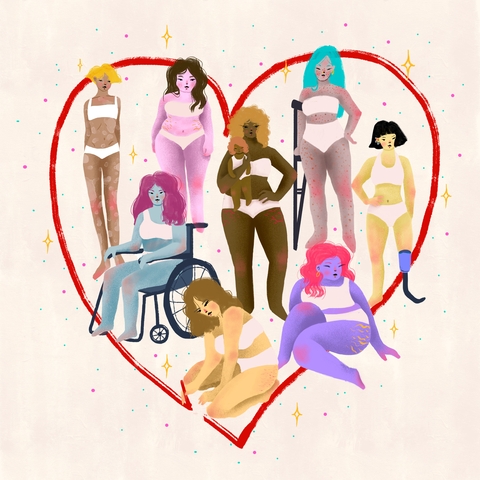Feeling the Weight: Some Beginning Notes on Disability, Access and Love
This essay was originally published in Issue Ten of Makeshift Magazine by Mia Mingus.
This is a beginning; a dive into waters that I swim every day, but have been taught not to speak about. I struggle with how to talk about love out loud in a way that holds access and doesn’t diminish love in all its glory, but instead illuminates how ableism twists and threatens love and relationships. Needing to constantly negotiate access for my physical disability within all my relationships in an ableist world has shaped the kind of connection and love I am able to have. I have been scared to open up the Pandora’s box that holds the intimacies of ableism. Scared to talk about some of the deepest parts of what disability has meant in my life.
Most days I feel like access and love are like oil and water. I wonder how the two can possibly coexist. I am speaking of love broadly, meaning any relationship where there is love, whether that is between friends, lovers, family members (chosen, birth, situational), community members, etc. As a queer disabled woman of color adoptee, I am questioning the very fabric that makes up love and, in particular, disabled people’s access to love—or, rather, the kinds of love (and relationships) that disabled people have access to. How can disabled people who rely on our loved ones for daily access be our whole selves when that threatens the relationships our access and survival depends on? And how can this support genuine, deep, loving relationships?
The activist-dreamer-revolutionary part of me believes that access and love don’t have to be separate. It is the part of me that is committed to revolutionary love, radical love, or whatever it’s being called these days. It lives off of the idea that somehow, if we work hard enough at this thing called liberation, our lives will be different: institutions, relationships and all.
But my life has proven different. My lived experience has left me holding one half of my heart in each hand, one for access and one for love, crushed. I have found myself on cold windy cliffs, staring at the canyon between the two.
I have watched ableism tear apart relationships with people I love. I have seen access be too much of a barrier for people to be in relationship with each other. I have made excuses for inaccessibility because I loved people and didn’t want to lose relationship with them. I have excused racism, sexism, violence, homophobia because I didn’t want to, couldn’t afford to, lose access. I have asked for access or raised ableism in relationships, only to have those relationships end abruptly. I have stayed in relationships for access and I have been too afraid to enter into relationships because of access. I have had access held over my head, leveraged for able-bodied supremacist means, or treated like a reward for good behavior. I have had access made invisible or belittled by loved ones; I have had to make access happen so the person providing access didn’t know they were. I have kept parts of myself from people I love because I was afraid to, didn’t know how to, be whole and complex in the context of needing access.
This is the cruelty of ableism: it robs us from each other. This is the weight of access. This is what gets said in whispers, not on the microphone and at the panel. This is what gets shared in a fleeting glance between us, disabled, sick, crip folks; a recognition, a silent sigh, an unfocused stare. This is what we don’t share, don’t know how to share, because it is so instinctual, so ground-level, so what’s-the-point-it’s-never-going-to-change. This is the air I’ve breathed since I can remember, as a disabled child, never knowing it could be any different—never having been able bodied.
The weight of inaccessibility is not logistical. It is not just about ramps, ASL interpreters, straws and elevators. It is a shifting, changing wall—an ocean—between you and I. It is just as much feeling and trauma as it is material and concrete. It is something felt, not just talked about. It is made up of isolation from another night at home while everyone else goes to the party. The fear of being left by the people you love and who are supposed to love you. The pain of staring or passing, the sting of disappointment, the exhaustion of having the same conversations over and over again. The throbbing foolishness of getting your hopes up and the shrinking of yourself in order to maintain. It is an echoing loneliness; part shame, part guilt, part constant apology and thank you. It is knowing that no matter how the conditions around me change, my body will still not be able to do certain things—it will still need other people, it will still signal dependence, it will still be disabled.
At 30, I have experienced many different kinds of beautiful love, largely because I have had the privilege of not being locked away in an institution, group home or my family’s back room like many disabled people. And indeed, to question the love I have been honored to experience on this page is terrifying and puts my current relationships, love and access at risk. But these are the parts of disability justice and liberation that keep me up at night, that have hurt more than any ableist remark, that have left more scars than any surgery. This is the underbelly of ableism. This is what I fear we will be left to wrestle with after every building is made accessible and every important policy is passed. This is what I desire as a queer disabled woman of color adoptee: to be able to love and not have access used as a weapon, and to be able to have access without the fear of losing love.
